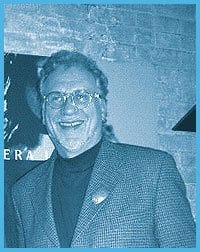In the early morning hours of Thurs, Jun 12, 2003, the AIDS movement in BC, Canada and the world lost one its most tireless activists and passionate advocates for the rights of people living with HIV/AIDS.
After a long battle with Hepatitis C, exacerbated by advanced HIV-infection, Glen Hillson died peacefully at St Paul’s Hospital, surrounded by loving friends and family. He was 51.
Hillson was born Feb 11, 1952, the youngest of four brothers. He spent his formative years in Briercrest, Saskatchewan and was proud of his prairie roots. At age 15, following his father’s death, Hillson and his mother moved to Moose Jaw. In his late teens, he spent the summer months soil sampling in Whitehorse-a period that later produced many tales of his “Yukon bush days.”
After moving to Vancouver, Hillson became involved in politics. Employed by the city, he eventually became a union organizer, representing the city’s outside workers, now part of the Canadian Union of Public Employees. Also one of the province’s top curlers, Hillson achieved the height of his sporting career in 1988 in the Brier as third for skip Ron Thompson’s rink; he curled competitively until 1993 when his health began to decline.
A long-time survivor with AIDS, Hillson was diagnosed with HIV in the early 1980s. He became extremely ill from AIDS-related complications in 1996, before his health was remarkably restored by the advent of protease inhibitors. It was largely a result of this life-saving intervention that Hillson’s passion for AIDS activism emerged.
In 1996, he joined the BC Persons with AIDS Society (BCPWA) as a volunteer peer treatment information counsellor. Two years later, he was recruited to BCPWA’s board of directors where he was soon elected chair, a position he held until his death. Around that time, Hillson also joined the Canadian Treatment Action Council (CTAC), Canada’s national HIV treatment advocacy organization; he served as CTAC’s vice-chair for two years.
Among Hillson’s many achievements were the securing of the Monthly Nutritional Supplement Benefit, implemented in 2001, and the creation and nurturing of BCPWA’s living+ magazine. Most recently, he worked with others to lobby the provincial government and the medical community around issues of HIV and Hepatitis C co-infection, including access to drug therapies and liver transplantation.
Hillson was a passionate man. He was passionate about his partner, his work, his friends, fine food and wine, and a good curling match. He was deeply passionate about social justice. He had a vision of a society where people’s rights were acknowledged, respected and protected and he worked tirelessly towards that end.
If you were right, he would fight alongside you through every layer of bureaucracy, every closed door, every utterance of prejudiced opinion and bad science. If you were wrong, he would fight your error with every telling fact and logical argument, every political ally, and every organizational strategy he could muster.
Hillson is survived by his life partner, Gerald Obre, his mother, three brothers and many dear friends. A memorial service honouring his proud life took place Jun 23 at St John’s United Church in Vancouver.
* The family wishes to acknowledge Hillson’s many friends for their support and the nurses from Unit 10C in St Paul’s Hospital for their exceptional care. In lieu of flowers, the family has requested that donations be made, in Hillson’s memory, to BCPWA, 1107 Seymour St, 2nd Floor, Vancouver, BC V6B 5S8.

 Why you can trust Xtra
Why you can trust Xtra


